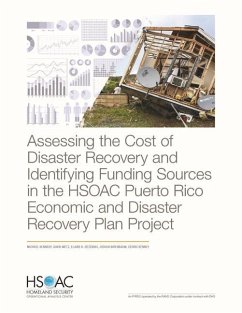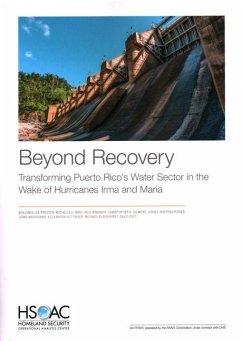Nicht lieferbar

Words Whispered in Water
Why the Levees Broke in Hurricane Katrina
Versandkostenfrei!
Nicht lieferbar
Every person in the world who was old enough to watch TV watched the events of Words Whispered in Water unfold. Now, the 20th anniversary of the Flooding Catastrophe in New Orleans is almost upon us: August 29, 2025. Rosenthal's book has not only stood the test of time but is deserving of even further attention and appreciation. Since the first edition's debut in August 2020, the Associated Press (AP) has revised its style guide for its reporters all over the world. AP reporters when writing about the flooding of New Orleans must note that levee failure played a major role. This style guide ...
Every person in the world who was old enough to watch TV watched the events of Words Whispered in Water unfold. Now, the 20th anniversary of the Flooding Catastrophe in New Orleans is almost upon us: August 29, 2025. Rosenthal's book has not only stood the test of time but is deserving of even further attention and appreciation. Since the first edition's debut in August 2020, the Associated Press (AP) has revised its style guide for its reporters all over the world. AP reporters when writing about the flooding of New Orleans must note that levee failure played a major role. This style guide change is a direct result of Rosenthal's book and her research. Words Whispered in Water is a rare story about how a tiny woman prevailed against a mammoth federal agency and won. With corporations getting ever larger-and even able to influence the outcome of presidential elections-the power of a single individual might seem lost. Words Whispered in Water proves that the power of a single individual is alive and well. When steel-reinforced floodwalls broke in New Orleans during Hurricane Katrina, the responsible party, the Army Corps of Engineers, went into full-time damage control mode. The federal agency-in cooperation with a powerful engineering trade group-spent millions bamboozling the American public. The Army Corps blamed the resulting flood devastation and death on Mother Nature and the low moral character of the city's residents. But in the chaotic aftermath, Sandy Rosenthal uncovered evidence that the Army Corps had made egregious design mistakes in their floodwall design fifteen years earlier. When they buckled and failed, they caused nearly 1,400 deaths and $200 billion in damages. With no special training, she exposed the scandal and eventually changed the narrative from "natural disaster" to "federal floodwall failure." How this miracle of public truth-telling was accomplished is the subject of Words Whispered in Water. Everyone relies on the Army Corps of Engineers whether they know it or not. Nearly two-thirds of the American population lives in counties protected by floodwalls. The Army Corps' budget for 2024 is $8.7 billion for civil works projects. A pie chart of annual federal spending in the United States shows a sliver big enough to see with the naked eye. The Army Corps employs 37,000 people, and there are Army Corps-built structures in every state of the nation. Words Whispered in Water highlights the importance of exposing the bad behavior of giant corporations and bureaucracies whose unsavory activities affect millions of people. As many Fortune 500 companies are owning up to their bad behavior by flooding the airwaves with advertising promising to do better, Rosenthal's vigilance regarding the Army Corps has the potential to produce a similar pay-off that could hundreds of thousands of lives in the future. Rosenthal's story is crucial reading for potential citizen activists looking who desire to make a difference. Additionally, Words Whispered in Water provides lessons for politicians and bureaucrats from City Hall, to Congress, to the almost faceless Army Corps. In this era of lies and deception at every level in public life, the author shows how to use persuasiveness, persistence and free tools like the Freedom of Information Act, videos and social media to prevail. Finally, Words Whispered in Water offers a valuable warning as to what is likely to happen in this time of eroding coastlines, coupled with America's history of trying to control-instead of coexist-with water.














